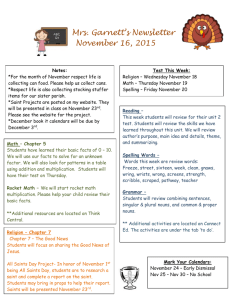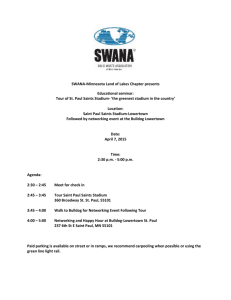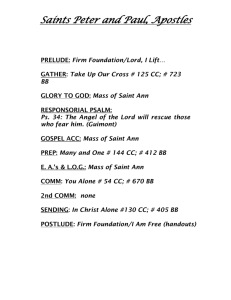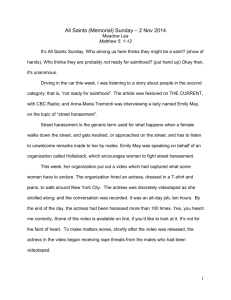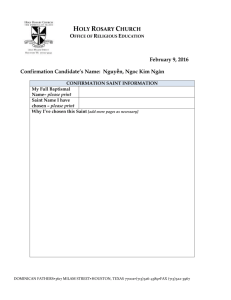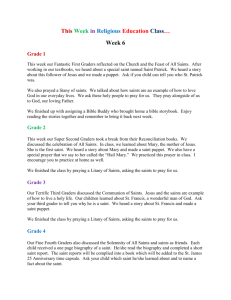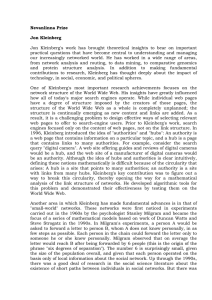Relst 350: Advanced Topics in Religious Studies: SAINTHOOD
advertisement
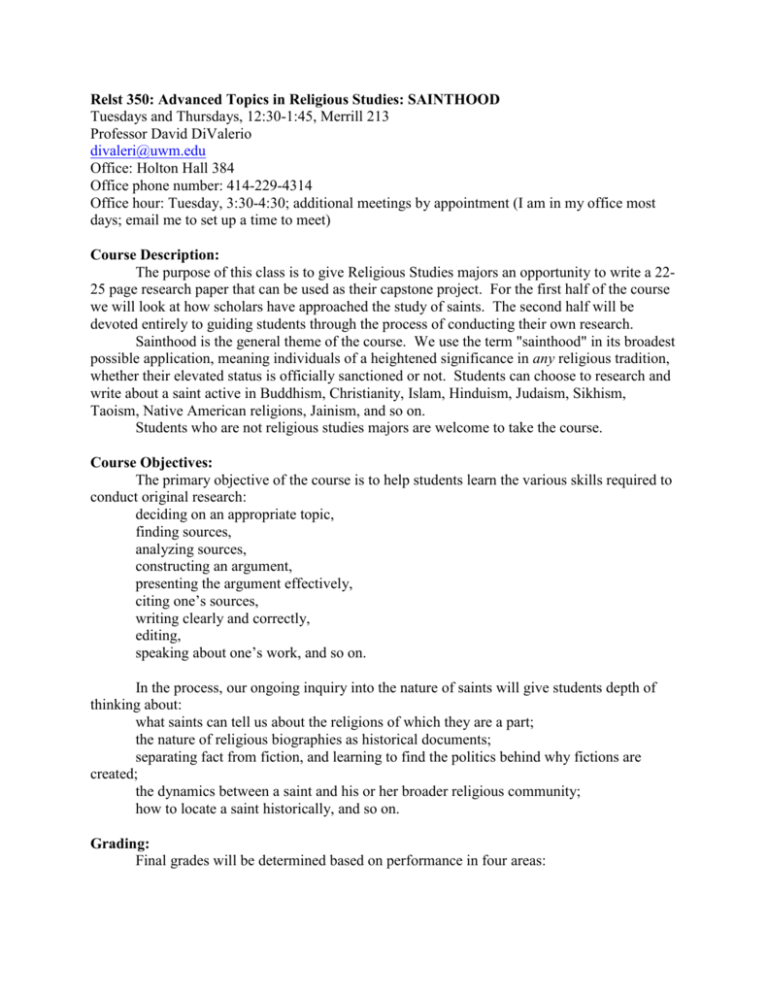
Relst 350: Advanced Topics in Religious Studies: SAINTHOOD Tuesdays and Thursdays, 12:30-1:45, Merrill 213 Professor David DiValerio divaleri@uwm.edu Office: Holton Hall 384 Office phone number: 414-229-4314 Office hour: Tuesday, 3:30-4:30; additional meetings by appointment (I am in my office most days; email me to set up a time to meet) Course Description: The purpose of this class is to give Religious Studies majors an opportunity to write a 2225 page research paper that can be used as their capstone project. For the first half of the course we will look at how scholars have approached the study of saints. The second half will be devoted entirely to guiding students through the process of conducting their own research. Sainthood is the general theme of the course. We use the term "sainthood" in its broadest possible application, meaning individuals of a heightened significance in any religious tradition, whether their elevated status is officially sanctioned or not. Students can choose to research and write about a saint active in Buddhism, Christianity, Islam, Hinduism, Judaism, Sikhism, Taoism, Native American religions, Jainism, and so on. Students who are not religious studies majors are welcome to take the course. Course Objectives: The primary objective of the course is to help students learn the various skills required to conduct original research: deciding on an appropriate topic, finding sources, analyzing sources, constructing an argument, presenting the argument effectively, citing one’s sources, writing clearly and correctly, editing, speaking about one’s work, and so on. In the process, our ongoing inquiry into the nature of saints will give students depth of thinking about: what saints can tell us about the religions of which they are a part; the nature of religious biographies as historical documents; separating fact from fiction, and learning to find the politics behind why fictions are created; the dynamics between a saint and his or her broader religious community; how to locate a saint historically, and so on. Grading: Final grades will be determined based on performance in four areas: Final paper: 40% Incremental writing assignments: 40% (4 assignments, 10% each) In-class participation: 15% Final presentation: 5% Attendance: You may miss three class sessions without penalty. Every absence after that for which you do not have a note from a doctor or a university administrator will count as “unexcused” absence and will result in an automatic deduction of *10 points* from your participation grade. If you miss class for whatever reason, it is up to you to get the material you missed from a classmate. For example, if you miss a total of six classes, and you have a doctor’s note saying that you had the flu for one of them, you have five unexcused absences. Three of those are “free” absences, and you will be penalized for the other two. You will lose a total of 20 points from your final participation grade. That is the equivalent of losing 3 percentage points from your final grade for the course. Materials: There are two required books, which will be available at the UWM bookstore: 1) Prophets in Their Own Country: Living Saints and the Making of Sainthood in the Later Middle Ages, by Aviad Kleinberg. Chicago: Chicago University Press, 1997. Paperback. 2) Renunciation and Power: The Quest for Sainthood in Contemporary Burma, by Guillaume Rozenberg (translated by Jessica Hackett). New Haven: Yale University Southeast Asia Studies, 2010. Paperback. There will also be a handful of readings that will be scanned and posted on D2L. They are marked below with an *. It is required that you have these readings with you on the days we will be discussing them, so you must print them out or bring in a computer or other electronic device on which you can look at them. Students will be using the Chicago style of citation for their research in this course. If you are on campus, you should be able to access a guide to the Chicago style here: http://www.chicagomanualofstyle.org/16/contents.html Week 1 Jan 24 - Introduction to the course Jan 26 – *The Passion of Saints Perpetua and Felicity, 387-397; *The Life of Saint Martin of Tours, by Sulpicius Severus, 1-29 Week 2 Jan 31 – *The Life of Saint Francis of Assisi, by Thomas of Celano, read first half of pages 11137 Feb 2 – *The Life of Saint Francis of Assisi, by Thomas of Celano, read second half of pages 11137 Week 3 Feb 7 – Kleinberg, 1-39 Feb 9 – Kleinberg, 40-98 Week 4 Feb 14 – Kleinberg, 99-164 Feb 16 - saints in other traditions; *a selection from The Life of Drukpa Kunle, 25-86 Week 5 Feb 21 - Female Hindu Saints in America: *Raj, “Ammachi, the Mother of Compassion,” 20317; *Pechilis, “Gurumayi, the Play of Shakti and Guru,” 219-37. Feb 23 – Saints in the Colonial Americas: *Greer, “Iroquois Virgin: The Story of Catherine Tekakwitha in New France and New Spain,” 235-49; *Myers, “‘Redeemer of America’: Rosa de Lima (1586-1617), the Dynamics of Identity, and Canonization,” 251-71 Week 6 Feb 28 – Library workshop: finding sources March 1 – Rozenberg, 1-41 Week 7 March 6 – Rozenberg, 42-86 March 8 – Rozenberg, 87-134 Week 8 March 13 – Rozenberg, 135-158 March 15 - no readings; brief write-up of paper topic due (assignment 1). Peer discussion. Spring Break Week 9 March 27 - finding sources; assembling a bibliography March 29 - no class; individual meetings; bring bibliography to meeting (assignment 2) Week 10 April 3 - analyzing sources April 5 - analyzing sources 2 Week 11 April 10 - crafting a thesis statement April 12 - no class; individual meetings Week 12 April 17 - thesis statement and outline due (assignment 3); peer review April 19 – library workshop: how to cite Week 13 April 24 – building an argument; writing mechanics April 26 - no class; individual meetings Week 14 May 1 - first draft due (assignment 4); peer review May 3 - grammar and finer points; editing Week 15 May 8 - Final presentations May 10 - Final presentations Final papers due: Monday, May 14th, 2:30pm
